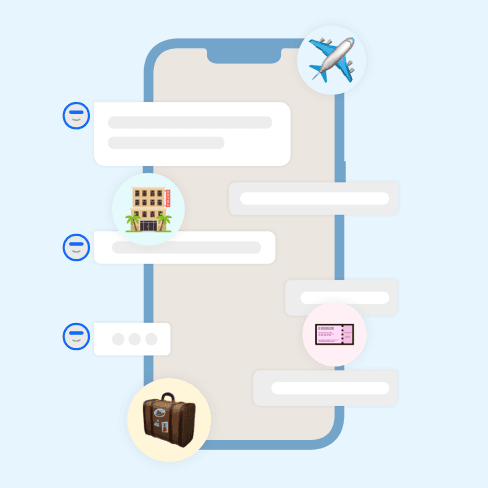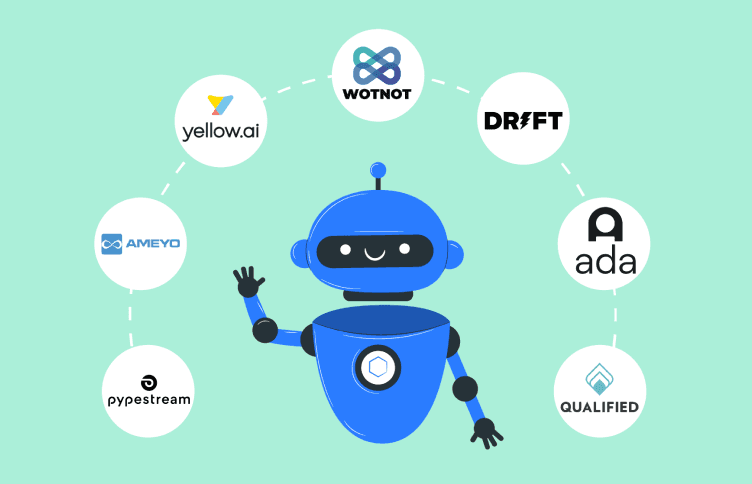Chatbot /
8 Min read
Travel Bots in 2024: Top Benefits, Use Cases, and Examples
May 30, 2020

Hardik Makadia
CEO, WotNot
With technological advancements, the way people now plan their trips has changed. Gone are the days when people visited local travel agents to book a flight or a hotel. Travel bot is the latest trend that companies are leveraging on to transform the travel experience digitally. This has helped them a great deal to attract more travelers and retain their clients.
Travel bots are integrated with websites or messaging apps to help businesses automate their regular tasks.
Nowadays, travel chatbots are increasingly being utilized by players in the tourism industry to cater to new-age wanderers and stand strong in the face of competition.
What is a Travel Bot?
A travel chatbot is an automated virtual assistant that guides customers with all the digital requirements of traveling.
This may include:
Planning a trip
Choosing destinations
Booking flights
Making payments
Sightseeing tours
Booking return tickets
A travel bot can also answer simple questions and point customers toward helpful resources.
A travel bot can be set up to simply answer standard queries. But it can also use Artificial Intelligence, Machine Learning, and Natural Language Processing to understand customer intent, analyze problems and provide solutions based on previous interactions.
Top 5 Benefits Of Chatbot for Travel Industry
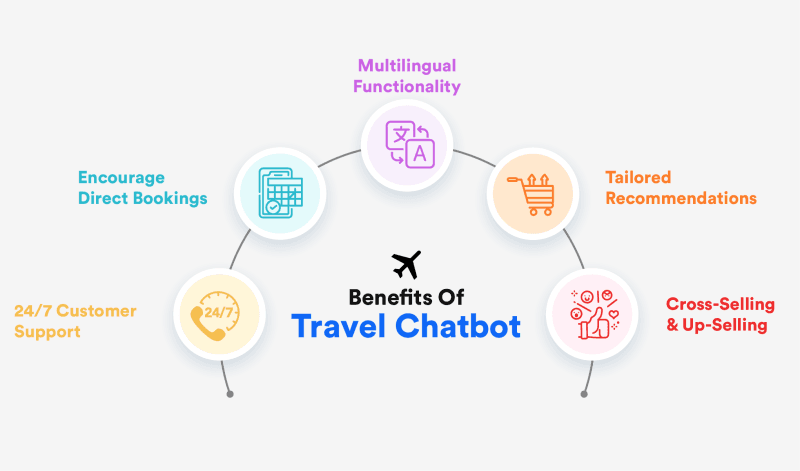
1. 24/7 Customer Support
In such a highly competitive market, one cannot afford to let a single prospect go unattended. Especially when a customer planning a trip wants their burning questions answered as soon as possible.
It is important to be available round-the-clock, whenever those questions come up.
A travel chatbot is available all the time, providing solutions on visitors’ preferred channels of communication. At the same time, chatbots offer a cost-efficient means of customer support for businesses as they eliminate the need for hiring additional personnel to handle customer inquiries.
With chatbots on their website/apps, travel companies are addressing customer queries even outside operational hours.
2. Encourage Direct Bookings
Online Travel Agencies like Expedia and Booking.com dispense a lot of tours and travel information and persuade travelers towards many trip decisions like destinations, hotels, eateries, etc.
They also provide direct links to the booking pages of these companies, thus lending a hand to increase their revenue. But to do so, companies have to pay a commission or a joining fee to these OTAs.
Through the conversational marketing capabilities of chatbots, companies are creating a direct marketing strategy to attract visitors and travelers. In this way, a travel bot levels the gap between direct bookings and bookings made via the OTAs.
3. Multilingual Functionality
In the age of globalization, travelers from all over the world might be interested in the travel services of a travel company or agency from a different country.
In such a scenario, travel companies worldwide need to support their international clients linguistically and make them feel equally as welcome as their domestic clients.
Thanks to the travel bot and its multilingual functionality, businesses can cater to even the most distant clients in their languages, whenever they come knocking. One can even proactively reach new audiences speaking different languages using a multilingual chatbot.
Multi-lingual bots are powered by NLP (Natural Language Processing) engines such as Google’s Dialogflow and IBM Watson. Engines like Dialogflow provides an option to build a travel bot in 20 different languages. The engines are also backed by machine learning capabilities.
Travel chatbot removes language barriers and brings companies one step closer to their customers. It helps them grow their customer base and foster customer engagement and loyalty amongst their existing customers.
4. Cross-Selling and Up-Selling
Through a travel chatbot, it becomes easier for travel companies to upsell or cross-sell from one offering to another. Say, for example, a visitor tries to book tickets for a flight from an OTA’s chatbot, it subtly recommends to the visitor to book cabs to and fro from the hotel to the airport at the arrival and departure dates, in one go. This move is to ensure that the visitor can have one less thing to worry about.
A travel bot may also send promotional alerts to those on their list so that their customers and prospects are updated on any new deals on flight or hotel bookings.
Based on user history and preferences, an AI-based travel bot can show customers the offers and discounts that they are more likely to select. This proves to be an effective way to cross-sell and bring them back for repeat business through new deals and offers sent via SMS or Facebook Messenger updates.
5. Tailored Recommendations
Chatbot for travel can also serve as an intelligence-gathering tool that assists a travel agency to understand its customers. With customer contact details, past journeys, the preferred method of payment, etc. — a travel bot can not only personalize a customer’s experience but also reward loyal customers in order to increase repeat business — all through a well-designed travel bot conversation.
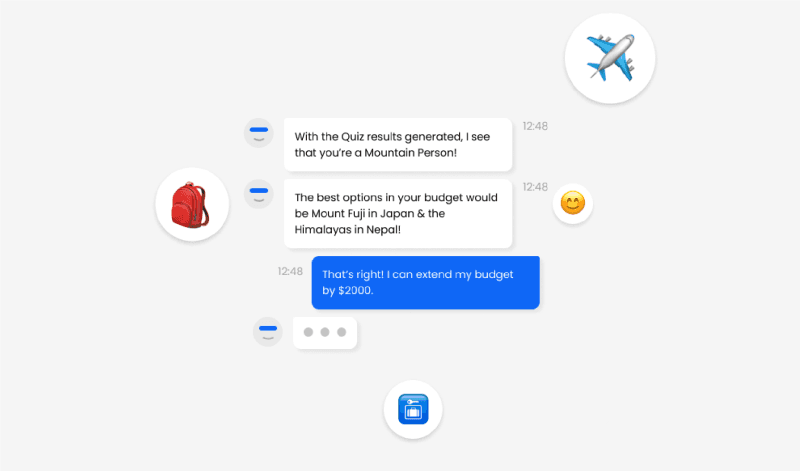
Chatbots deployed by credible businesses like Southwest Airlines, Expedia, Emirates Vacations, etc. have already implemented chatbots to streamline their operations and provide seamless customer service.
These chatbots greet customers and provide all possible options within a specified budget and location. The entire itinerary can be fixed – all through the chatbot, facilitating end-to-end customer support.
Top 10 Use Cases Of a Travel Bot
1. Hotel, Flight and Conveyance Bookings
A travel chatbot easily proves to be a simple and user-friendly solution to the problem of complicated booking processes. Trip planning begins with conveyance and hotel bookings. In the search for the lowest prices and best deals, people scour through a multitude of websites and apps. A vast plethora of options from different sources all over the internet only confuses the customer, making them rethinking their choices/plans.
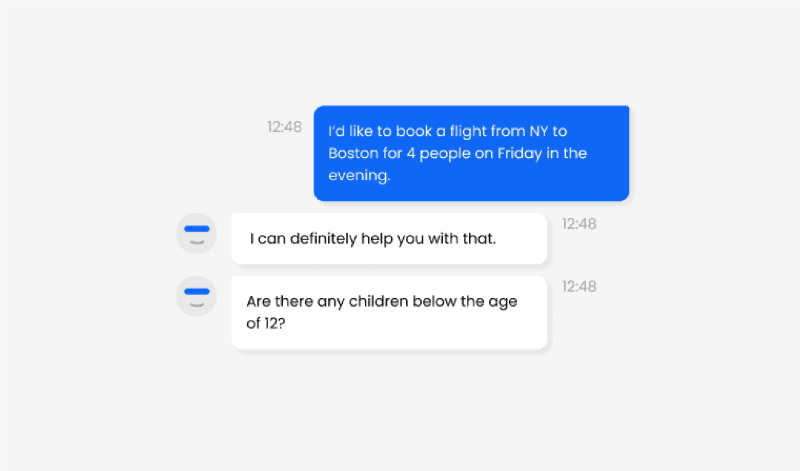
According to a research by Expedia Media Solutions, people visit an average of 38 websites while planning their trips.
A travel bot can provide all the answers that travelers look for on these websites. Travel chatbot provides contextual responses to the queries of the customer. With chatbots, travelers can also approach a travel agency or company to seek recommendations and book flights and hotels.
Moreover, a travel bot can be deployed on different channels like WhatsApp, Facebook, Skype, Slack, Twitter, etc., enabling customers to have a uniform experience.
2. Canceling Reservations
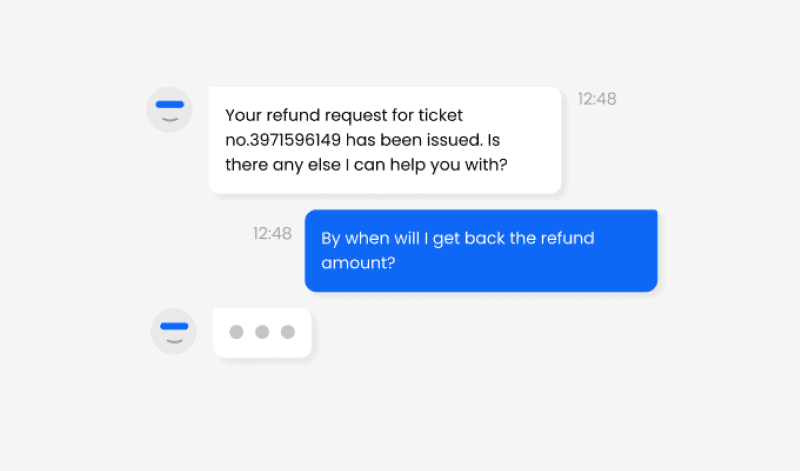
In the unfortunate event that a customer has to cancel their reservation, the chatbot can handle that too. As long as the customer has their booking reservation on hand, the bot can cancel the booking, recommend replacement bookings, and start processing a claim for a refund.
3. Itinerary Planning
Not just recommendations and bookings, a travel bot can be programmed to assist the traveler throughout the trip. Right from deciding where to go to building an itinerary to tracking expenses, chatbots are increasingly becoming the go-to AI travel assistant for wanderers.
4. Information Capture
A chatbot presents a refreshing conversational replacement for long boring forms and probes the users about their preferences in an interactive manner.
This is because with chatbots, you can ask as many questions as you want in a conversational manner. This ensures that the prospects fill in all the details without getting bored or switching to some other tab.
Also, many chatbots use AI to adapt and respond instantly to any of the prospect’s responses. This helps in better data collection and creates a way better customer experience as compared to "book a demo" forms.
Also Read: How Chatbots Have Killed "Book a Demo" Forms
5. Local Guide
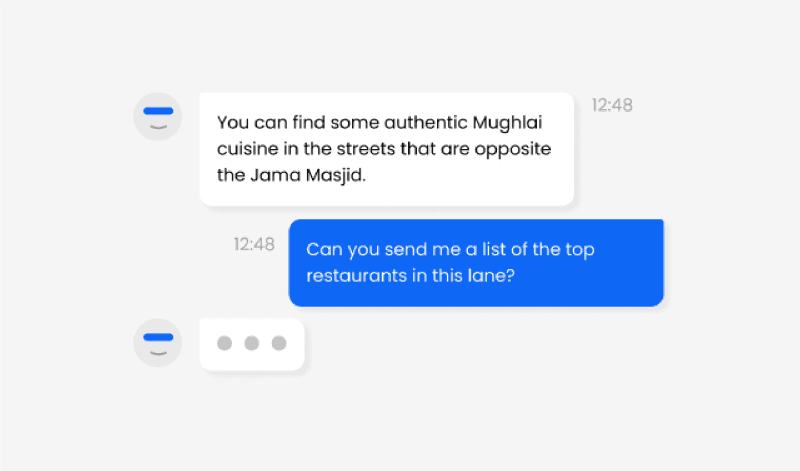
A travel bot can also act as a local guide for the tourists. It can help them in many ways like:
Offer a list of sight-seeing spots
Suggest popular local food
Locate rental car service
Provide local weather forecast
6. Answer FAQs
Chatbots can be an effective tool for automating FAQs. When a customer types a question into the chatbot, it uses natural language processing (NLP) algorithms to understand the meaning of the question and provides a relevant response. This can save businesses time and resources, while also providing customers with quick and accurate answers to their questions.
7. Human Handover
If the bot is asked something which requires a human agent to jump in, the bot can simply collect the details of the prospect and notify the human agent. The agent can then get back to the person with the required solution.
8. Airport Assistance
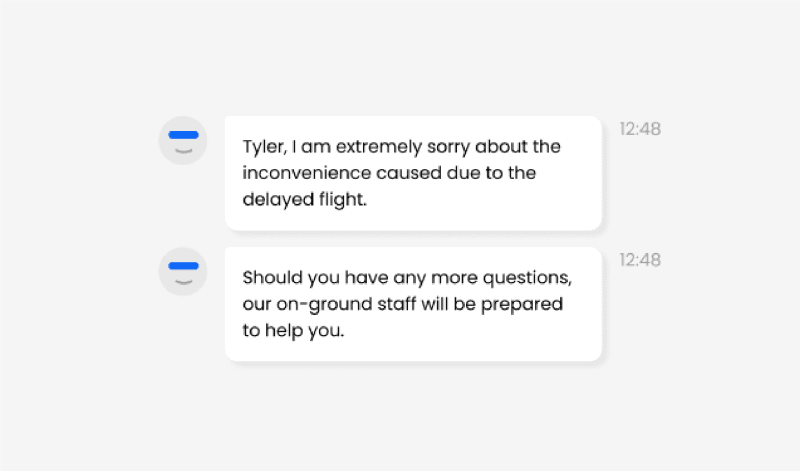
Some airports like Lyon Airport and Frankfurt Airport use a travel bot to provide travelers with airport guides, flight status, and information about airport lounges, shops, restaurants, and more. In addition, a travel bot can keep customers up-to-date on any changes or disruptions to their travel plans, such as flight delays or cancellations.
9. Feedback Collection
Chatbots can also be used to conduct customer feedback surveys for collecting feedback from customers. Chatbots can automatically send reminders to customers urging them to write reviews and submit ratings for the services provided.
10. Language Translation
Travel bot helps customers communicate in their own preferred languages while traveling, by providing translations of common phrases and words.
5 Real Life Examples of Travel Bots
Chatbots are increasingly being preferred by travel companies worldwide. Big names like WestJet, Expedia and Booking.com have already implemented chatbots that provide flight and hotel recommendations and process bookings, thereby providing a simplistic and unifying experience to the user. But these are not the only ones, the list is long.
Let us take a look at some of major travel sector companies that have implemented a chatbot to level up their customer experience.
1. Deyor Camps
Through WotNot’s WhatsApp chatbot, Deyor Camps have been able to significantly amp up its overall revenue growth.
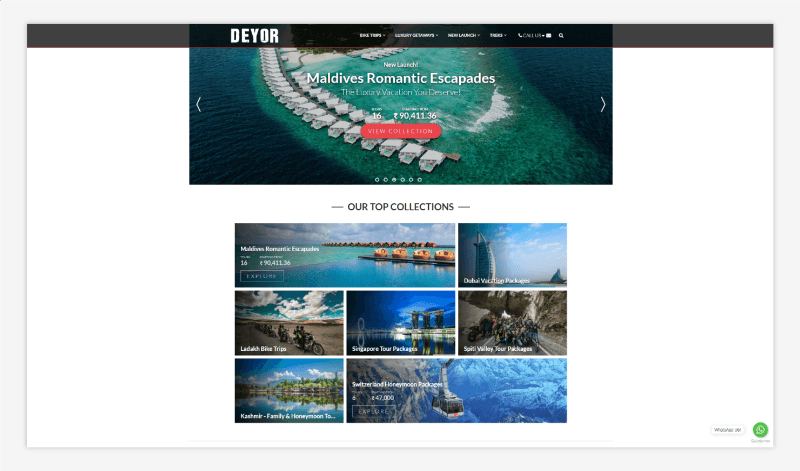
Within just a few months, Deyor’s marketing department witnessed the following results from deploying the WhatsApp chatbot.
44,220 conversations struck
25,385 inquiries generated
57.4% in lead conversion
2. FCM Travel Solutions
FCM, a global player in the travel management industry, launched its AI chatbot application named Sam which provides travel assistance at every stage of the trip.
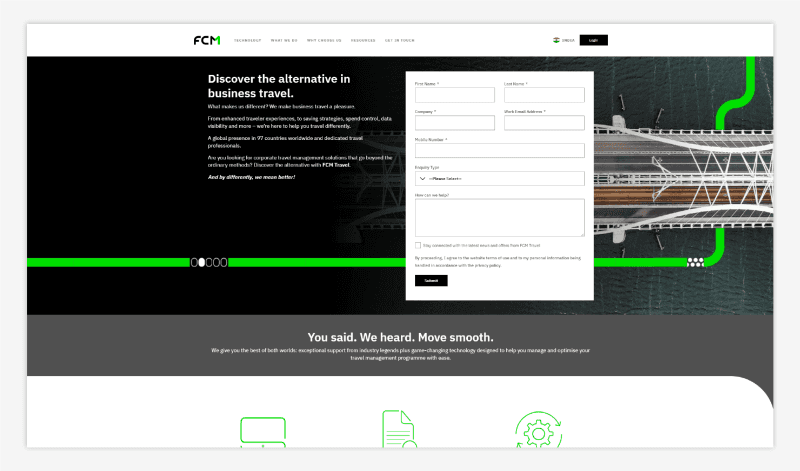
Focused mainly on business travel, Sam enables travel bookers and managers to manage their travel itineraries, alerts them about flight delays or cancellations, calculates travel expenses, and provides booking options compliant with the travel policies of the user’s company.
3. Skyscanner
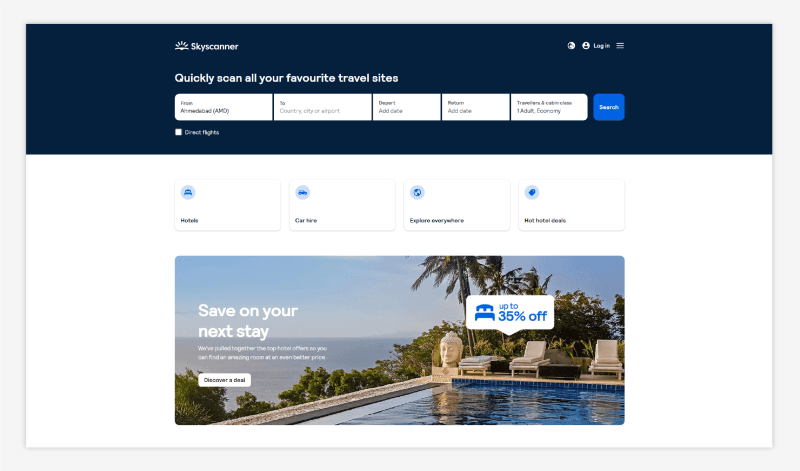
Skyscanner was one of the first travel sector brands to introduce conversational search interfaces. In February 2018, Skyscanner reported having surpassed one million chatbot interactions.
4. Expedia
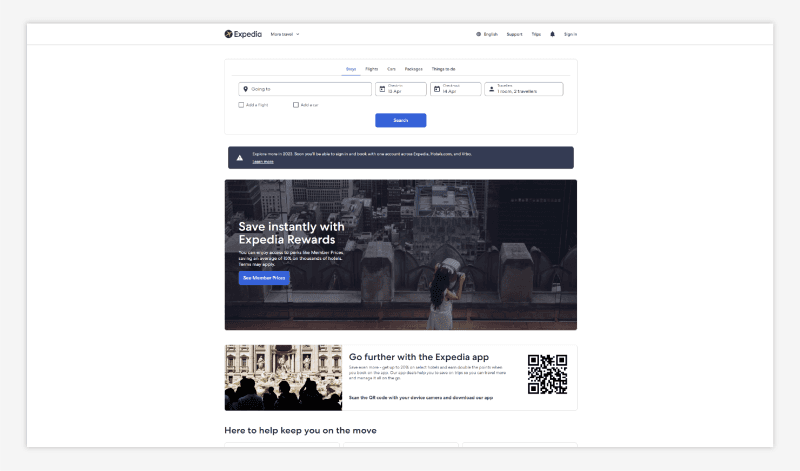
Expedia’s chatbot lets customers manage their bookings easily. Their chatbot’s automated FAQ answering lets customers check dates and enquire about their hotel’s facilities. Customers can also cancel their bookings through the chatbot app and find out the status of their refund.
5. Emirates Holidays
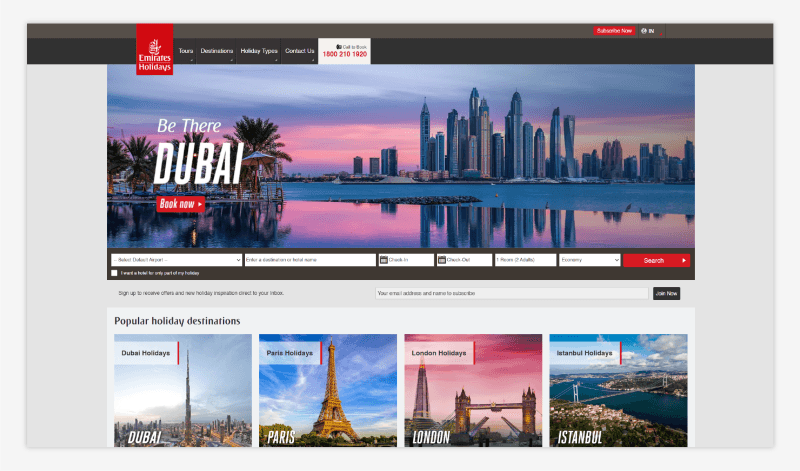
Emirates Holidays’ fully-functional chatbot, Ami, is a state-of-the-art chatbot that allows users to:
Create bookings
Check availability of reservations
Reschedule or cancel their booking
Complete trip assistance for its travelers
Wrapping Up
A travel bot comes with multi-faceted benefits for a travel agency/business. 24*7 availability, prompt response, saved user history, and unified user experience are some of the many benefits of chatbots. In the era of digitization, chatbots provide a seamless and hassle-free experience to users, thus making them stick to that particular brand.
It isn’t as easy as it seems to create a genuinely beneficial chatbot. It is important to design the chatbot such that it provides value to both the business and its customers.
We, at WotNot, understand this and have worked with businesses across verticals to develop a valuable and scalable chatbot that works as a personal AI travel assistant and provides a seamless experience to customers.
So, what are you waiting for? Sign up now to build your travel bot with WotNot. You can also contact us or schedule a demo for the same.
ABOUT AUTHOR
Hardik Makadia
CEO, WotNot
His leadership, pioneering vision, and relentless drive to innovate and disrupt has made WotNot a major player in the industry.
